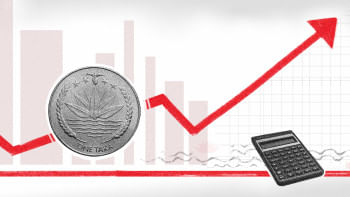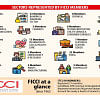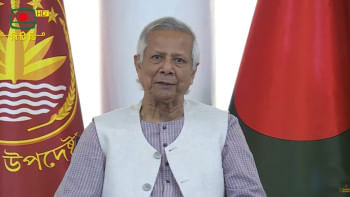To end inequality, stop pandering to plunderers

There is a genuine concern among Bangladeshi experts that at a time when the country is experiencing some of the toughest economic challenges in years – persistent high inflation, unemployment (particularly among the educated youth), etc – fulfilling the IMF's loan conditions without making the necessary policy adjustments could fuel inequality. As per the Bangladesh Bureau of Statistics' (BBS) recently published Household Income and Expenditure Survey (HIES) 2022, the Gini Coefficient has gone up to 0.499. In the HIES 2010, the Gini Coefficient was 0.458, and rose to 0.482 in HIES 2016 – indicating that over the past decade and more, inequality has been on the rise.
Numerous studies over the years, including the ones carried out by the IMF, have consistently shown that inequality tends to rise during IMF programmes or as a result of its conditions. That is not to say that the policy reforms prescribed by the IMF for Bangladesh are wrong or unnecessary. On the contrary, most local experts agree that the majority of reform measures built into the IMF loan were long overdue.
For example, experts have been calling for the government to use a flexible interest rate – allowing the rate to adjust with the market – which the IMF has also recommended. However, due to the prevailing circumstances, they have also called on the government to provide specialised and subsidised credit schemes for the disadvantaged, such as those involved in agriculture, small and medium businesses, and others.
Another delicate matter that the government needs to handle tactfully is the IMF's condition of reducing tax exemptions. One would assume that the primary reason why this is necessary was the government's limited fiscal space, driven largely by Bangladesh's woeful tax-GDP ratio.
Bangladesh has one of the lowest tax-GDP ratios in South Asia – at 7.9 percent, whereas the ideal benchmark is 15 percent. The country needs to collect an additional tax revenue of Tk 250,600 crore to raise it to 15 percent.
The State of Tax Justice 2020 report calculated that Bangladesh is losing more than $703 million every year because of tax abuses committed by multinational corporations and private individuals. Multinational corporations alone cost the country $674 million annually. This year, the Centre for Policy Dialogue (CPD) estimated that Bangladesh was losing potential taxes from as low as Tk 41,800 crore to as high as Tk 223,000 crore yearly because of tax evasion. The amount of tax losses rises when tax avoidance is taken into account (between Tk 55,800 crore and Tk 292,500 crore), and much of this happening with the "unethical support from tax practitioners."
We can debate all we want over how wise or unwise the government's budget allocation (and implementation over the next fiscal year) will be. But should it continue to fail to address the issue of inequality, it is high time we recognised that the failure is not a result of innocent mistakes or miscalculated economic policies, but the government's willingness to pander to the wishes of special interest groups who are plundering the wealth being produced by the hard-working (majority of) people of this country.
Aside from the fact that many people do not pay income tax, data from the Registrar of Joint Stock Companies and Firms and the NBR shows that 45,000 out of 213,000 registered companies and firms filed returns, meaning only one in five registered businesses pays tax. Hence, the CPD advised the government to "withdraw all kinds of non-transparent tax-related provisions, including provision for whitening black money" (which contradict tax transparency efforts) from the national budget.
In an interview a few days ago, Planning Minister MA Mannan said sustaining development and curbing inequality were key major challenges facing the economy. In that case, clearly the government should increase its budgetary allocation for social safety net programmes. But that alone will not suffice because of the rampant corruption involved in government aid programmes.
A number of studies over the years have uncovered how nepotism, corruption, and political bias in enlistment have weakened the safety net plans intended to help the poor and other vulnerable groups. For instance, a World Bank report in 2016 found that about 60 percent of safety net programme beneficiaries did not qualify as being vulnerable.
More recently, a CPD survey found that almost 30 percent of old-age allowance beneficiaries and 33 percent of widows allowance beneficiaries were not eligible for the grant. And this is happening while 3.3 million elderly people and 2.5 million widows who are eligible for the benefits remain outside of the programme. Thus, about Tk 1,500 crore is wasted in only two schemes. What is even more reprehensible is the fact that eligible beneficiaries are made to pay Tk 2,653 on average in bribes for the benefits. The survey further alleged that the authorities, despite knowing about the irregularities, have done nothing to stop them.
The complete lack of conscience one has to have to deny the elderly and widows from accessing such facilities might not be easy for ordinary people to relate to, but it seems to have become common among government officials responsible for implementing and monitoring such schemes. And it is one of the main reasons why social safety net programmes have continuously failed to somewhat negate the inequality problem in Bangladesh.
To his credit, the planning minister did admit this earlier, as well as the fact that vested groups had gotten themselves in an advantageous position, which is leading to the poor being deprived. But what is worrying is that he himself questioned whether his government was capable of taking action against these groups as that might put the government in trouble.
This brings us to the crux of the matter. At this point in time, addressing many of our economic problems is proving to be difficult not mainly for economic reasons, but because of political ones. And they are largely to blame for why and how we have gotten here as well. So, we can debate all we want over how wise or unwise the government's budget allocation (and implementation over the next fiscal year) will be. But should it continue to fail to address the issue of inequality, it is high time we recognised that the failure is not a result of innocent mistakes or miscalculated economic policies, but the government's willingness to pander to the wishes of special interest groups who are plundering the wealth being produced by the hard-working (majority of) people of this country.
Eresh Omar Jamal is assistant editor at The Daily Star. His Twitter handle is @EreshOmarJamal

 For all latest news, follow The Daily Star's Google News channel.
For all latest news, follow The Daily Star's Google News channel. 










Comments